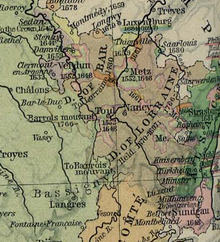Three Bishoprics
The Three Bishoprics (French: les Trois-Évêchés [le tʁwɑz‿eveʃe]) constituted a government of the Kingdom of France consisting of the dioceses of Metz, Verdun, and Toul within the Lorraine region.
[citation needed] The insurgents in turn received subsidies and military assistance from the French, their troops moved into the Habsburg hereditary lands and laid siege to the emperor at Innsbruck, while his brother Ferdinand I entered into negotiations that led to the revocation of the Augsburg Interim by the 1552 Peace of Passau.
Backed by Duke Francis of Guise and his brother Cardinal Charles of Lorraine, King Henry II of France upon his agreement with the Protestant princes had started his Voyage d’Allemagne "for the sake of German liberties".
From the emperor's perspective, Elector Maurice and his allies had no right to legally dispose of Imperial territory, Charles V started a campaign against the French in order to reconquer the occupied dioceses culminating in the Siege of Metz from 19 October 1552 to 2 January 1553.
The townsmen of Metz filed several petitions to the Imperial Diet for redress, but the retrieval of the lost Three Bishoprics was no longer a main concern of the Empire during the ongoing confessionalization.

